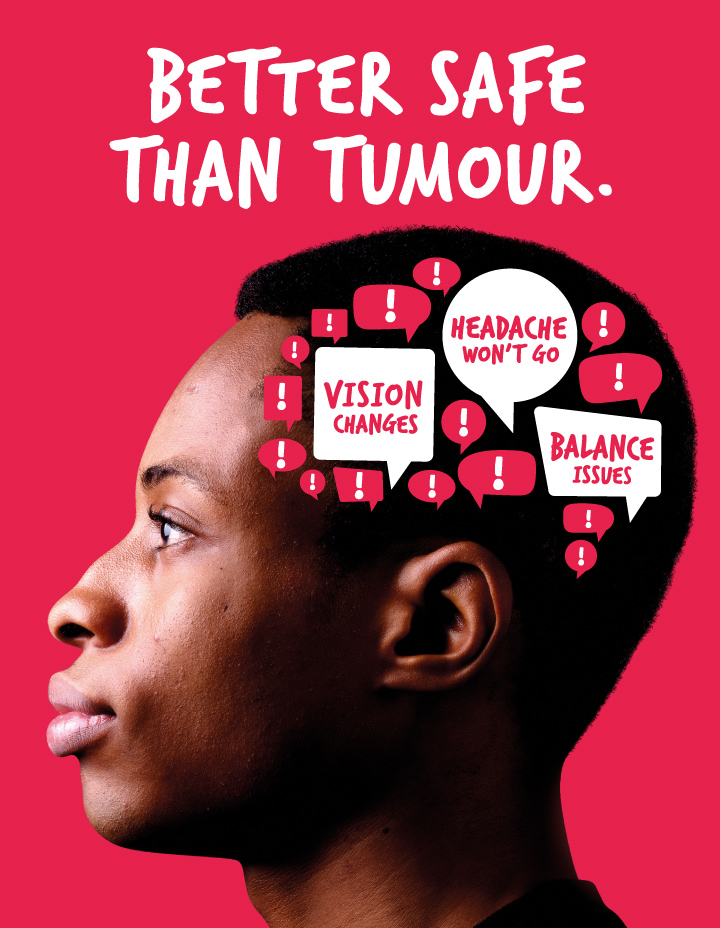Headaches in children
Headaches in children are common and can be caused by things like stress, dehydration, genetics and more. While most children who have a headache will not have a brain tumour, headaches are one of the symptoms of brain tumours, making it important to know the signs to look out for.

Children who have a headache caused by a brain tumour are likely to be experiencing other symptoms, so you should look out for these carefully.
On this page, we’ll cover:
- What causes headaches in children?
- Could my child’s headache be a brain tumour?
- Other symptoms of brain tumours in children
- What to do if you think your child has a brain tumour
Other symptoms
Use our Better Safe Than Tumour symptom checker to check for other brain tumour symptoms.
Talking to your doctor
Learn more about how to approach your GP.
Get your free Information Pack
Our Brain Tumour Information Pack can help you better understand your diagnosis and feel confident talking to your medical team.
What causes headaches in children?
As with adults, headaches in children can be caused by a few different things. Here are some of the causes:
- Illness: anything from common colds to infections can cause headaches
- Stress: feeling stressed, anxious, or depressed can trigger headaches in children
- Injury: a knock to the head can lead to a headache. Be sure to keep an eye on this and take your child to the doctor if the headache is worsening or if they’re showing signs of concussion.
- Dehydration: headaches might be caused by even mild dehydration
- Genetics: headaches are thought to be passed down by parents. They are believed to be triggered by early puberty in girls
- Brain tumours: one of the symptoms of brain tumours is headaches
Could my child’s headache be a brain tumour?
Brain tumour headaches are caused by a build-up of pressure in the brain. This could be due to the tumour pressing on blood vessels and nerves within the brain or blocking the flow of cerebrospinal fluid (CSF) within the brain.
Signs to look out for:
- your child has a persistent headache which occurs regularly
- your child is experiencing other symptoms, such as vomiting
- the headaches are waking your child up while sleeping
- the headaches frequently occur when your child wakes up
- your child becomes tired, confused or less alert when they have the headache
- sometimes it may be difficult for young children to explain how they are feeling. You may notice visual signs such as your child holding their head or neck.
If you are concerned about your child it is important to get them checked out by your GP or optician.
Other symptoms of brain tumours in children
Headaches are a common symptom of brain tumours but will usually be accompanied by other symptoms.
Some of these are:
- Changes in vision like blurred or double vision
- Nausea and vomiting
- Trouble balancing or difficulties with motor skills
- Seizures or fits
- Changes in behaviour like tiredness and reduced energy
- A tilted head or stiff neck
- Delayed puberty
- Slow growth
- Excessive thirst
- Reduced consciousness
I think my child has a brain tumour, what should I do?
Brain tumours are rare, however, if you’re worried and a symptom such as a headache persists or if your child has more than one symptom of a brain tumour then:
-
Talk to your doctor
GP appointments are usually quite short, so make sure you find out how to best prepare for your child’s appointment. - Get an eye test
If your child’s symptoms are limited to changes in vision and/or headaches, get their eyes tested by an optician before seeing your GP. - Go to A&E
If the symptoms are sudden or severe, you should go to your emergency department or call 999.
In this section

Know the Signs and Symptoms
Although brain tumours are rare, if you or a loved one are experiencing two or more of the signs and symptoms it’s important that you speak to your doctor to rule out a brain tumour.
Share your experiences and help create change
By taking part in our Improving Brain Tumour Care surveys and sharing your experiences, you can help us improve treatment and care for everyone affected by a brain tumour.